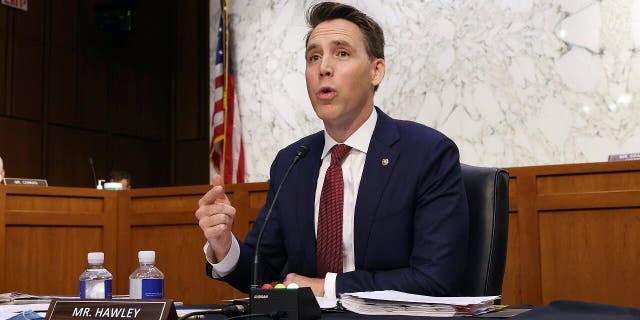
Electoral College objections in Congress: What to know
Sen. Hawley defends pledge to object to swing-state electors
Sen. Hawley defends pledge to object to swing-state electors
The House and Senate will convene at 1 p.m. Wednesday for a joint session of Congress to certify President-elect Joe Biden's electoral win, and a group of GOP lawmakers intends to raise objections to the results.
The traditional tally of the electoral results from each state is the final stage in the selection of an American president. It's normally a lackluster procedure, but President Trump has changed that by calling on his GOP allies in Congress to fight for him until the bitter end.
A good number have stood with Trump, but other Republicans have blasted the last gasp of resistance as detrimental to democracy and counter to the U.S. Constitution.
"To challenge a state’s certification, given how specific the Constitution is, would be a violation of my oath of office—that is not something I am willing to do and is not something Oklahomans would want me to do," Sen. Jim Inhofe, R-Okla., said in a statement Tuesday in announcing he will be accepting Biden's win.
On the other end of the divided Republican Party are lawmakers who are responding to the frustrations of voters who continue to believe that the election was stolen from Trump. More demonstrations are planned in Washington, D.C., and Trump is expected to address the crowds at 11 a.m.
Reps. Jim Jordan, R-Ohio, and Marjorie Taylor Greene, R-Ga., have said at least 100 House Republicans are supporting the objections. In the Senate, at least 13 Republicans have said they'll object to the results in some fashion, with Sens. Josh Hawley, R-Mo., and Ted Cruz, R-Texas, leading the way.
"I don't know the outcome, but I think it's worth fighting for," Greene told Fox News of the final effort to stop the certification.
Rep. Marjorie Taylor Greene speaks to Trump supporters. (Twitter/@mtgreenee)
Greene hopes the objections will set off a debate in Congress over the allegations of voter fraud that courts thus far have not taken up. Greene spoke to Trump about election irregularities abroad Air Force One when she accompanied him to a rally in Georgia Monday night.
"It's our duty to object," Greene said. "… The American people deserve to at least start to hear the evidence of fraud."
To prepare for the debate, the House Judiciary Committee GOP staff prepared a 41-page memo outlining alleged electoral problems in six states, such as making mail-in ballots more readily available during the coronavirus pandemic.
"The last-minute push for all-mail in voting in many states, coupled with moves to erase long-standing safeguards for mail-in voting, created conditions ripe for election administration errors or election-related crimes," the memo obtained by Fox News states.
House Republicans are preparing to object to the electoral votes in at least six states that Biden won — Georgia, Arizona, Michigan, Pennsylvania, Wisconsin and Nevada. As of Tuesday afternoon, it was unclear how many states would get support from a senator, which is necessary for any debate to begin.
Cruz will object to Arizona, with a focus on creating an Electoral College commission to audit the results and not necessarily for setting aside the election results, according to a source familiar. Hawley has narrowed in on Pennsylvania. And Republican Sen. Kelly Loeffler, who was projected to lose her Georgia Senate seat to Democrat Raphael Warnock after Tuesday's election, was expected to object to certification in Georgia.
GOP SENATORS 'STILL DISCUSSING' WHICH STATES TO OBJECT TO DURING JAN. 6 ELECTORAL COLLEGE CERTIFICATION
Biden won the Electoral College vote 306-232, but Trump has refused to concede and has instead repeated unproven allegations of widespread vote fraud that have been rejected by the Supreme Court, his attorney general, state election officials and dozens of other courts.
Some Democrats have objected to election results in the past when GOP presidents have won, but they've come out strong against this last-ditch effort.
Rep. Steny Hoyer, the House majority leader, says Trump's ongoing claims of voter fraud are "seditious" and blasted Republican leaders who have refused to acknowledge that Biden won the election fair and square.
"They have cavalierly supported by their silence, or by their active participation the president's false claim — his, in many ways, seditious claim — that the vote was not fair," Hoyer said Tuesday. "…It's a tragedy that they have done so."
Here are some things to know before the Joint Session convenes:
Vice President Mike Pence waves as he walks off the stage after speaking at the Turning Point USA Student Action Summit, Tuesday, Dec. 22, 2020, in West Palm Beach, Fla. (AP Photo/Lynne Sladky)
VP Mike Pence will play a ceremonial role
When the House and Senate meet together Wednesday at 1 p.m., Vice President Mike Pence is expected to preside over the Joint Session of Congress.
Trump has placed pressure on Pence to help him out during this process, insisting that Pence has the power to object to ballots and telling a Georgia crowd Monday that he hopes Pence "comes through for us."
But regardless of how much the president turns up the volume on his vice president, White House officials tell Fox News that Pence will "follow the law" on Wednesday.
The electoral votes will be brought into the House chamber in mahogany boxes.
Pence will begin the tally of votes from each state in alphabetical order starting with Alabama and then Alaska.
The first expected objection is to come from Arizona, where Biden won.
Sen. Ted Cruz, R-Texas, speaks at a campaign rally for Sen. Kelly Loeffler, R-Ga., on Saturday, Jan. 2, 2021, in Cumming, Ga. (AP Photo/Brynn Anderson)
Objections only work if there’s support from both a senator and a representative.
Under the Electoral Count Act, a petitioner from both the House and Senate are required to challenge a state’s slate of electoral votes, and the objection must be in writing.
Cruz has indicated he'll join the House in objecting to Arizona, according to a source familiar. Cruz has led a group of about a dozen senators who say they would object to the certification of the Electoral College results unless there was an emergency 10-day audit of the results by an electoral commission. Cruz is expected to raise the Electoral College commission issue — but not settling aside the election results altogether.
The debate is slated for two hours with Democrats and Republicans taking turns talking.
Once there is a joint objection, the senators will go back to their chamber, and the House will stay in its chamber to debate the merits of that state's electors.
Members will have a five-minute speaking limit.
In this March 3, 2020, file photo, House Intelligence Committee Chairman Adam Schiff, D-Calif., talks to reporters on Capitol Hill in Washington, D.C. (AP Photo/J. Scott Applewhite, File)
Democrats have former impeachment managers leading their debate.
House Speaker Nancy Pelosi tapped Rep. Adam Schiff, chair of the Intelligence Committee, and Rep. Zoe Lofgren, chair of the House Administration Committee, to lead to Democratic response. Both are former impeachment managers.
Others prepared to lead the debate are Rep. Jamie Raskin, D-Md., a constitutional law professor, and Rep. Joe Neguse, D-Colo., who sits on the Judiciary Committee.
Democrats who represent the state that is being challenged will also speak in defense of the validity of the election results.
A vote of both the majority of the House and Senate is needed to throw out a state’s slate of electors.
After the debate, the House and Senate will both vote on whether to accept that state's electors.
It's a roll call vote that will document how each lawmaker stands on each state's electors.
It takes both the House and Senate to reject a state’s electoral votes. If that happens, the electoral slate just disappears. It would be as though Arizona never voted.
Sen. Josh Hawley, R-Mo., speaks during the confirmation hearing for Supreme Court nominee Amy Coney Barrett at the Senate Judiciary Committee on Capitol Hill in Washington, Monday, Oct. 12, 2020. (Win McNamee/Pool via AP)
This could take a very, very long time.
After the votes on that particular state, the House and Senate resume jointly again and begin the tally for the rest of the states.
If there is another joint objection, the House and Senate separate again for another two hours of debate and a vote on that contested state.
The time needed to separate, debate and vote on each state could be three to four hours.
The process repeats itself until all the states are counted.
The votes are not on Trump’s side
Since Democrats control the House and enough Republicans in both the House and Senate accept that Trump lost the election, these objections are a longshot effort.
At the end of the process, Biden and Kamala Harris are expected to be certified as the next president and vice president of the United States.
Their inauguration would be on Jan. 20.
Fox News' Chad Pergram, Jason Donner and Paul Steinhauser contributed to this report.
Source: Read Full Article





